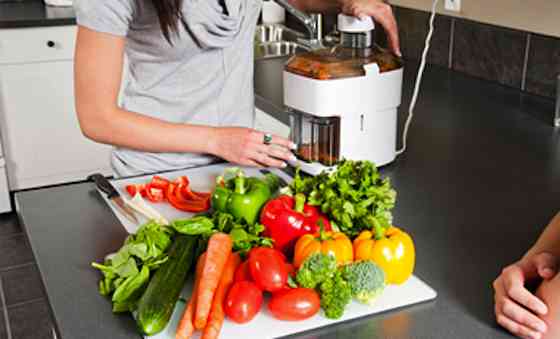- MENU
- HOME
- SEARCH
- WORLD
- MAIN
- AFRICA
- ASIA
- BALKANS
- EUROPE
- LATIN AMERICA
- MIDDLE EAST
- United Kingdom
- United States
- Argentina
- Australia
- Austria
- Benelux
- Brazil
- Canada
- China
- France
- Germany
- Greece
- Hungary
- India
- Indonesia
- Ireland
- Israel
- Italy
- Japan
- Korea
- Mexico
- New Zealand
- Pakistan
- Philippines
- Poland
- Russia
- South Africa
- Spain
- Taiwan
- Turkey
- USA
- BUSINESS
- WEALTH
- STOCKS
- TECH
- HEALTH
- LIFESTYLE
- ENTERTAINMENT
- SPORTS
- RSS
- iHaveNet.com: Health
By Environmental Nutrition

"Juicing" is on the fast-track from fad to full-on health craze. Thanks to an explosion of juice bars and celebrity endorsements, satisfying that thirst for greens, super fruits, or carrot juice is en vogue right now. But healthy as these juicy concoctions seem, there's a tall order of hype muddling science with slick marketing here.
Juicing can be a great way to get much-needed nutrients from fruits and vegetables, which evidence suggests may help prevent chronic diseases. A study published in a 2009 journal, The Proceedings of the
While juices squeezed fresh from whole ingredients provide many of the valuable vitamins, minerals and phytochemicals of whole fruit, the healthy fiber and fruit skins -- with their high concentration of nutrients, phytochemicals and antioxidants -- is discarded. Without that fiber, the body absorbs the sugar in fruit juices more quickly, which can promote a rapid increase in blood sugar levels. In addition, most juices are concentrated sources of the natural sugars from fruits, as it usually takes two or more servings of fruit to produce a one-half cup serving of fruit juice.
Diets and commercial plans that encourage strict juicing as meal replacement may skimp on essential nutrients, such as protein, which is needed for many functions in the body, including maintaining lean muscle mass. The result is a high-carb, low-fiber, low-protein "meal" that provides a rapid rise in blood sugar, which can leave you feeling hungry later.
Among the many claims of the superiority of juice, juicing proponents say the body absorbs nutrients from juice more easily than from whole fruits and vegetables, and that juice removes toxins from the body, boosts the immune system, aids digestion and helps with weight loss. But there is no sound scientific evidence that says extracted juices are any healthier than eating the whole fruit and vegetable, no matter the marketing claim. In addition, manufactured juices must, by law, be pasteurized which means they are heated to high temperatures, which studies show diminish some nutrients by as much as 70 percent.
Go ahead and get your greens -- or purples, yellows and pinks -- in a glass. Juicing can be a fun and tasty way to ramp up fruit and vegetable intake, as long as it's balanced in a diet that includes fiber, lean proteins and healthy fats. But try to limit your fruit juice servings to one four-ounce serving per day; get your other servings the old-fashioned way -- from whole fruit, like oranges, bananas, or apples.
You might also be interested in:
AGING | ALTERNATIVE | AILMENTS | DRUGS | FITNESS | GENETICS | CHILDREN'S | MEN'S | WOMEN'S
Juicing from fad to full-on health craze
Article: Copyright © Tribune Content Agency